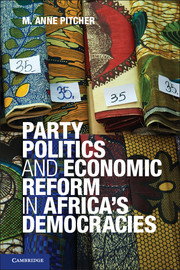Book contents
- Frontmatter
- Contents
- Tables, Figures, and Maps
- Acknowledgments
- Abbreviations
- Map
- 1 Understanding Institutional Development in Africa
- 2 From Motivational to Imperative Commitment
- 3 The Impact of Party Politics and Democratic Quality on Economic Reform
- 4 Party Fragmentation and Ad Hoc Private Sector Development in a Limited Democracy
- 5 Stable Parties, Limited Democracy, and Partisan Private Sector Development
- 6 Stable Parties, Liberal Democracy, and Strategic Compromise
- 7 Conclusion
- Appendix 1 Coding Scheme
- Appendix 2 Coding Scheme Indicators of Imperative Commitments
- Appendix 3 Effective Number of Parliamentary Parties (ENPP) in Nine African Democracies c. 1990s–2000s
- Bibliography
- Index
- References
5 - Stable Parties, Limited Democracy, and Partisan Private Sector Development
Mozambique
Published online by Cambridge University Press: 05 June 2012
- Frontmatter
- Contents
- Tables, Figures, and Maps
- Acknowledgments
- Abbreviations
- Map
- 1 Understanding Institutional Development in Africa
- 2 From Motivational to Imperative Commitment
- 3 The Impact of Party Politics and Democratic Quality on Economic Reform
- 4 Party Fragmentation and Ad Hoc Private Sector Development in a Limited Democracy
- 5 Stable Parties, Limited Democracy, and Partisan Private Sector Development
- 6 Stable Parties, Liberal Democracy, and Strategic Compromise
- 7 Conclusion
- Appendix 1 Coding Scheme
- Appendix 2 Coding Scheme Indicators of Imperative Commitments
- Appendix 3 Effective Number of Parliamentary Parties (ENPP) in Nine African Democracies c. 1990s–2000s
- Bibliography
- Index
- References
Summary
The starting point for the privatization of the Mozambican economy was much worse than that of Zambia. A seventeen-year war that concluded in 1992 had left the economy in a shambles. Infrastructure had deteriorated, many state firms were destroyed or not working, and the salaries of thousands of state workers were in arrears. State capacity in areas such as regulatory enforcement or technical expertise was low. The political environment was also discouraging. The two main parties that participated in the first democratic elections in 1994 were the belligerents in the war, and they brought many of their former grievances into the postwar settlement. The peace accord constructed a political system that relied on institutional means such as the rule of law, but also extra institutional mechanisms such as bargaining and threats to avoid damaging stalemates or a resurgence of conflict.
The experience of conflict, a fragile state, a failing economy, and a hostile political setting – these factors indicated to most observers that the privatization process would be protracted and conflictual; that its impact would lack credibility, and that its consequences would prolong political instability. Yet, not only did Mozambique sell a percentage of state firms comparable to that of Zambia, but also its imperative credibility score was higher than Zambia’s. It sustained positive growth rates over more than a decade and attracted significant amounts of new investment. Particularly noteworthy was that the government relied on private sector development to rebuild state capacity.
- Type
- Chapter
- Information
- Party Politics and Economic Reform in Africa's Democracies , pp. 145 - 186Publisher: Cambridge University PressPrint publication year: 2012

